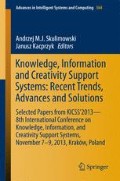Abstract
In Japan, by far the most popular creative problem-solving methodology using creative thinking is the KJ Ho method. This method puts unstructured information on a subject matter of interest into order through alternating divergent and convergent thinking steps. In this paper, we explain basic procedures associated with the KJ Ho and point out some of its most specific applications.
KICSS’2013 Invited Lecture [6].
Access this chapter
Tax calculation will be finalised at checkout
Purchases are for personal use only
References
Kawakita J., Hasso-Ho
 , Chuko Shinsho, no. 136 (in Japanese) (1966)
, Chuko Shinsho, no. 136 (in Japanese) (1966)Kawakita, J., Makishima, S.: Problem Solving—KJ Ho Workbook
 Kodansha, Japan (in Japanese) (1970)
Kodansha, Japan (in Japanese) (1970)Kawakita, J.: Clouds and Water—Nomadic University Chronicle of Hard Working
 Kodansha, Japan (in Japanese) (1971)
Kodansha, Japan (in Japanese) (1971)Kawakita, J. (ed.): Nomadic University—Japanese Islands are my Textbook
 . Kashima Kenkyujo Shuppankai, Japan (in Japanese) (1971)
. Kashima Kenkyujo Shuppankai, Japan (in Japanese) (1971)Kawakita, J.: The Original KJ Method, Revised edn. Kawakita Research Institute (1991)
Kunifuji, S.: A Japanese problem solving approach: the KJ-Ho (Method). In: Skulimowski, A.M.J. (ed.) Looking into the Future of Creativity and Decision Support Systems: Proceedings of the 8th International Conference on Knowledge, Information and Creativity Support Systems, Kraków, Poland, 7–9 Nov 2013 (Invited lecture). Advances in Decision Sciences and Future Studies, vol. 2, pp. 333−338. Progress & Business Publishers, Kraków (2013)
Kunifuji, S., Kato, N., Wierzbicki, A.P.: Creativity support in brainstorming. In: Wierzbicki, A.P., Nakamori, Y. (eds.) Creative Environment: Issues of Creativity Support for the Knowledge Civilization Age, Studies in Computational Intelligence (SCI) vol. 59, pp. 93−126. Springer (2007)
Naganobu, M., Maruyama, S., Sasase M., Kawaida S., Kunifuji S., Okabe A. (the Editorial Party of Field Science KJ Ho): Exploration of Natural Fusion, Thought and Possibility of Field Science. Shimizu-Kobundo-Shobo, Japan (in Japanese) (2012) (Note: Published as a Kawakita Jiro Memorial Collection issue covering various topics of Fieldwork Science and the KJ Ho)
Viriyayudhakorn, K.: Creativity assistants and social influences in KJ-method creativity support groupware. Dissertation of School of Knowledge Science, JAIST, Mar 2013
Author information
Authors and Affiliations
Corresponding author
Editor information
Editors and Affiliations
Rights and permissions
Copyright information
© 2016 Springer International Publishing Switzerland
About this paper
Cite this paper
Kunifuji, S. (2016). A Japanese Problem-Solving Approach: The KJ Ho Method. In: Skulimowski, A., Kacprzyk, J. (eds) Knowledge, Information and Creativity Support Systems: Recent Trends, Advances and Solutions. Advances in Intelligent Systems and Computing, vol 364. Springer, Cham. https://doi.org/10.1007/978-3-319-19090-7_13
Download citation
DOI: https://doi.org/10.1007/978-3-319-19090-7_13
Published:
Publisher Name: Springer, Cham
Print ISBN: 978-3-319-19089-1
Online ISBN: 978-3-319-19090-7
eBook Packages: Computer ScienceComputer Science (R0)


 , Chuko Shinsho, no. 136 (in Japanese) (1966)
, Chuko Shinsho, no. 136 (in Japanese) (1966) Kodansha, Japan (in Japanese) (1970)
Kodansha, Japan (in Japanese) (1970) Kodansha, Japan (in Japanese) (1971)
Kodansha, Japan (in Japanese) (1971) . Kashima Kenkyujo Shuppankai, Japan (in Japanese) (1971)
. Kashima Kenkyujo Shuppankai, Japan (in Japanese) (1971)